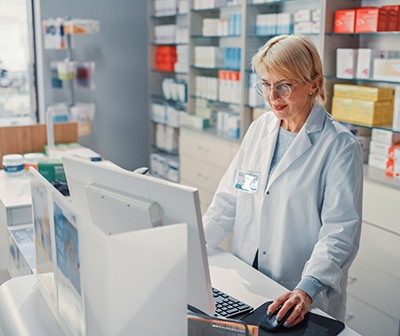Bridging the Gap: How Pharmacies are Becoming Key Players in Proactive Healthcare


Healthcare’s growing emphasis on proactive care and improved patient outcomes requires effectively closing care gaps; the discrepancies between recommended and actual healthcare delivery. Yet, achieving this patient-centered care isn’t seamless. The reality often involves fragmented data, limited visibility across providers, and manual processes.
Health plans can take a more proactive approach by strategically leveraging pharmacies to bridge these care gaps. This isn’t just about dispensing medications; it’s about recognizing the unique position of pharmacies within the healthcare ecosystem and empowering them with the right data and tools to make a real difference.
The Untapped Potential: Why Pharmacies are a Game Changer

The average patient interacts with a pharmacy significantly more often than their primary care physician. With widespread accessibility and extended hours, pharmacies are often the most frequent point of contact within the healthcare system. Patients also place a high level of trust in pharmacists generating a powerful opportunity for pharmacists to proactively address care gaps.
Pharmacists possess a wealth of medication expertise, making them invaluable in improving medication adherence, identifying potential drug interactions, and providing crucial patient education. However, their role extends beyond dispensing; Pharmacists can conduct preventive screenings, administer immunizations, and act as a vital link in care coordination.
However, the current system often limits pharmacists’ visibility into the broader patient care journey. Without access to vital information like recent lab results or physician visit summaries, their ability to intervene proactively is hampered. This is where the strategic integration of data and technology becomes paramount.
Connecting the Dots: Technology as the Enabler
The evolution of platforms like EQUIPP® aims to bridge the information gap by connecting payers, pharmacies, and other providers.
Imagine a scenario where a pharmacist, while filling a prescription for a diabetic patient, can seamlessly access their latest A1c value or know when they last saw their endocrinologist. This real-time access to contextual data empowers the pharmacist to have more informed conversations, reinforce adherence, and identify potential issues that might otherwise go unnoticed.
Furthermore, this connected ecosystem facilitates a two-way flow of information. Providers can gain near real-time insights into medication adherence, allowing for timely interventions if a patient isn’t picking up their prescriptions. This collaborative approach, fueled by integrated data, leads to:
- Improved data quality and accuracy: Information is sourced directly and shared in near real-time.
- Reduced administrative burden: Integration into existing pharmacy and provider workflows minimizes the need for manual processes and separate platforms.
- More timely and targeted interventions: Healthcare professionals have the right information at the right time to address specific care gaps.
- Enhanced care coordination: A holistic view of the patient enables seamless collaboration across the continuum of care.
Ultimately, strategic pharmacy partnerships can improve patient outcomes and produce better quality scores for health plans. Measurable outcomes show:
- 15-25% improvement in medication adherence rates1
- 30% increase in immunization rates2
- $300-500 per member per year savings through preventive care interventions3
- Reduced emergency department visits and hospitalizations4
These aren’t theoretical benefits—they’re documented results from health plans that have embraced pharmacy as a strategic care delivery channel.
Beyond Dispensing: Documenting the Pharmacy Encounter and Staying in Workflow

The need to capture richer, more contextual data from pharmacy interactions beyond just claims and fill information has been addressed with Enhanced Services within EQUIPP. Payers are increasingly interested in understanding the specific interventions pharmacists are undertaking and their impact on patient engagement and outcomes.
Rolling out this year from PQS by Innovaccer is EQUIPP Copilot. By embracing new technology, EQUIPP Copilot can integrate directly into the pharmacy workflow, allowing pharmacists to document their encounters, including patient counseling, adherence support, and other clinical services, in real-time. This provides valuable insights into the “what” and “how” of pharmacy-driven care gap closure, moving beyond simply knowing a medication was dispensed.
Furthermore, these platforms are designed to assess patient engagement more effectively. By documenting conversations and understanding a patient’s awareness of their medication and condition, healthcare teams can gain a better understanding of their level of engagement and tailor interventions accordingly.
Also, EQUIPP Copilot overlays existing pharmacy management systems to allow seamless workflow integration. Pharmacists can now access relevant information and documentation tools within their familiar environment, while managing a high volume of tasks. This approach ensures scalability and minimizes disruption, making it easier for pharmacies of all sizes to participate in care gap closure initiatives.
The Future is Connected: A Collaborative Ecosystem
The vision for the future of healthcare involves a truly connected ecosystem where payers, providers, and pharmacies work collaboratively to improve patient health. Platforms that facilitate seamless data exchange and communication are crucial to realizing this vision.
The integration of pharmacy data with medical claims, EHR data, and even social determinants of health data will provide an even more comprehensive understanding of the patient. This holistic view will empower all stakeholders to deliver more personalized and effective care, ultimately leading to better outcomes and a more efficient healthcare system.
By strategically leveraging their accessibility, patient trust, and medication expertise, and by empowering them with integrated data and streamlined workflows, health plans can unlock a powerful resource for closing care gaps and driving meaningful improvements in patient health outcomes with pharmacists’ support. The future of healthcare lies not in building higher walls between providers, but in creating bridges that enable seamless, coordinated care. Pharmacies represent one of the strongest bridge-building opportunities available today.
To learn more about EQUIPP Copilot and request a demo, please visit here.
¹ Journal of Managed Care Pharmacy, “Pharmacy Interventions in Medicare Plans” (2023) 2 CDC Pharmacy Partnership Program Results, 2024 3 PharmaStar Rating Analysis Report, 2023 4 Health Affairs, “Cost Savings from Pharmacy-Led Interventions” (2024) ⁷ American Journal of Health-System Pharmacy, “Impact of Community Pharmacy Integration” (2023)
